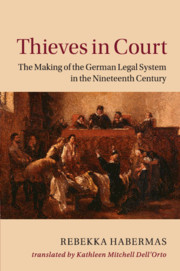Book contents
- Frontmatter
- Dedication
- Contents
- Acknowledgments
- Introduction: Questions Regarding Thieves, Reformers, Jurists, and Others
- PART I WHAT IS THEFT: QUESTIONS REGARDING THIEVES AND JURISTS – QUESTIONS REGARDING HONOR AND PROPERTY
- 1 Who Are the Thieves and Who Are the Victims?
- 2 How Does a Person End Up in Court – Why Does Something Go on the Record?
- 3 The Theft Happens – from Act to Crime
- PART II HOW LAW IS MADE: EVIDENCE PRODUCTION
- PART III IN THE COURTROOM, OR WHAT IS LAW?
- Conclusion: The Making of the Modern Legal System – Thieves and Property
- Relevant Laws
- Bibliography
- Index
2 - How Does a Person End Up in Court – Why Does Something Go on the Record?
from PART I - WHAT IS THEFT: QUESTIONS REGARDING THIEVES AND JURISTS – QUESTIONS REGARDING HONOR AND PROPERTY
Published online by Cambridge University Press: 18 November 2016
- Frontmatter
- Dedication
- Contents
- Acknowledgments
- Introduction: Questions Regarding Thieves, Reformers, Jurists, and Others
- PART I WHAT IS THEFT: QUESTIONS REGARDING THIEVES AND JURISTS – QUESTIONS REGARDING HONOR AND PROPERTY
- 1 Who Are the Thieves and Who Are the Victims?
- 2 How Does a Person End Up in Court – Why Does Something Go on the Record?
- 3 The Theft Happens – from Act to Crime
- PART II HOW LAW IS MADE: EVIDENCE PRODUCTION
- PART III IN THE COURTROOM, OR WHAT IS LAW?
- Conclusion: The Making of the Modern Legal System – Thieves and Property
- Relevant Laws
- Bibliography
- Index
Summary
Did conflict-laden encounters such as that between Anton Zimmermann and the two beggar boys – and such incidents were anything but uncommon – always have to be decided immediately in court? Why couldn't the parties settle the matter much more quickly and inexpensively among themselves? Was it really so unusual for a man like Zimmermann, who was older and physically stronger, with more social capital than the two sons of single mothers, to try noisily to gain respect and a little bread? Above all, did official action really have to be taken instantly for this behavior? The conflict in itself, jostling and theft of bread obtained by begging, was not especially important, new, or even unusual. How and why did a more or less everyday conflict actually become a crime on the record that, for good measure, was labeled “theft?”
What is unusual about the case, indeed, what is surprising and demands explanation is not Zimmermann's behavior, but the fact that the mother of one of the boys reported that behavior to the mayor, the police, or the district administrator's office. After all, without such a report, the entire matter would never have gone on record, and a rather harmless incident would not have become a property conflict that was transformed with costly legal resources into a lengthy court proceeding ending in a multi-year sentence of incarceration in irons.
Why weren't all other means of settling the conflict exhausted first? Why did new rules suddenly take hold in Electoral Hesse in mid-nineteenth century? The consensus among resarchers on the Early Modern Period is that, at least as late as the end of eighteenth century, going to court had been the last resort of those seeking to resolve a conflict. Why it seems had out-of-court settlement, at least in cases of theft, suddenly become the exception rather than the rule? Were the conditions for such out-of-court solutions as identified by Francisca Loetz for Early Modern Period societies missing in the Electoral Hessian villages?
- Type
- Chapter
- Information
- Thieves in CourtThe Making of the German Legal System in the Nineteenth Century, pp. 55 - 75Publisher: Cambridge University PressPrint publication year: 2016



